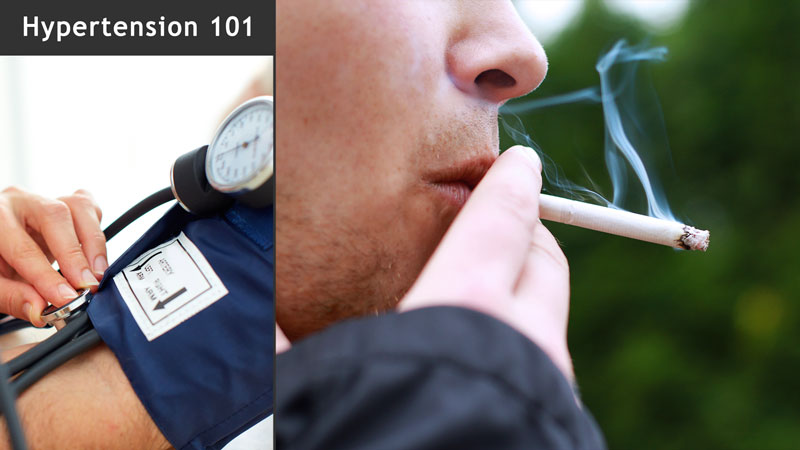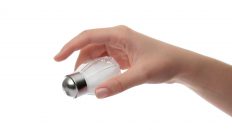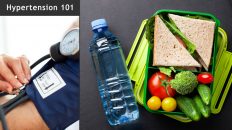By Marc Braman, MD, MPH
Marc Braman(MD, MPH):
Chemicals and hypertension. It turns out that there are actually a lot of chemicals that raise blood pressure. Obviously we don’t want to be directly causing or even contributing to our high blood pressure and then thinking we’re going to blow a gasket or need a whole bunch of medication. Let’s cover some basics from the American College of Cardiology’s Guidelines Made Simple. It’s not comprehensive, but we’ll hit the highlights. Recreational or mind-altering drugs, often a problem. Prescription medications, often a problem. We should include smoking in this list as part of chemicals, so we’re going to do that even though they didn’t. For some reason, I think they put it in a different category.
Looking through the biggest categories, tobacco or smoking stimulates the fight or flight response, raising blood pressure. It damages blood vessels. It impairs relaxation of blood vessels, which makes for less pressure. It increases inflammation. Smoking makes the blood thicker or more viscous, again, harder to pump, harder to get through those pipes. One of the primary ways that tobacco kills us is cardiovascular disease. We think often first of all about lung cancer, and that’s true, but heart attacks and strokes are an even bigger issue from smoking. Even in children exposed to secondhand smoke, we’re showing or seeing that it raises their blood pressure.
Alcohol, what about alcohol? Wine is good for your heart, right, doc? You hear it on the news all the time. The wine companies are promoting it all the time. I’ve got some good news and some bad news. In my opinion, having looked at a lot of the research, the weight of the science is there’s roughly 10% benefit and probably 90% harm. To be fair, let’s talk about this. Alcohol positives. It turns out alcohol is a blood thinner. Again, thick blood, thinning it, okay, that could be some benefit. It seems to pan out in the research. There’s a relaxing effect. Most of us could really use some relaxing, and there’s probably some physiologic benefit from that. Yes, of course, red wine does have some antioxidants.
But let’s look at this on balance. What are the negatives? Okay, you ready for this? Alcohol activates our fight or flight, raising blood pressure, disrupts our sleep physiology, messes up our rest phase. There’s a lot of empty calories, putting on the weight. It interferes with our blood pressure medications. It increases the side effects of our blood pressure medications. It inhibits willpower and decision making, which we need for the lifestyle changes. It activates the renin-angiotensin-aldosterone system for the kidneys, messing with the fluid balance regulation. It impairs the baroreceptor systems that measure the pressure in the system to regulate properly. It produces chemicals that constrict the blood vessels, raising blood pressure. It inhibits the relaxation chemicals like nitric oxide. It depletes the minerals of calcium and magnesium that we need for healthy blood pressures, and it increases inflammation.
Did you get all that? That was like a prescription drug commercial warning list, right? Not such a good idea. In fact, from a global perspective, there was a 2003 World Health Organization study that attributed 16% of global hypertensive disease to alcohol. Sorry, that’s with the red wine antioxidants factored in. Reducing alcohol for the average person equates to about a four-point drop in blood pressure.
What about caffeine? Oh, we’re crazy about caffeine these days. You see it on every street corner. Anyway, conflicting evidence. Some reviews have said that caffeine could be responsible for premature deaths, about 14% for heart disease and 20% of strokes. However, the weight of evidence as is presented in the guidelines is that caffeine probably isn’t keeping blood pressure up long-term. Obviously it raises it short-term. It also doesn’t seem to be the cause of increased cardiovascular disease. A little tip here, this may be because we use filters. Turns out, again, in my epidemiology classes, that where they use the unfiltered coffee, you get all the oxidized oils. You do see problems with inflammation and vascular issues. The guidelines come down to saying limit the dose.
Recreational drugs, obviously a lot of them are stimulants, meth, cocaine, crack, and so forth. It’s kind of super caffeine, if you will. All raise your blood pressure. All a pretty bad idea for a lot of reasons. Over the counter medications and supplements. You need to think about things like decongestants, going to raise your blood pressure. Herbals or botanicals, ma huang, yohimbine, and so forth. We have reason to be concerned about energy drinks. ER docs are seeing people showing up all jacked up because of their five energy drinks they just swigged down. Some of the most common ones, the NSAIDs, non-steroidal anti-inflammatories. Ibuprofen, trade name Motrin, Advil. Naproxen, trade names Aleve and Naprosyn. Even aspirin at pain level dosing that you may otherwise take for benefiting your heart.
Prescription medications. Many of the most common categories of prescription medications will raise your blood pressure. Anti-depressants and anti-psychotics, huge numbers of medications. Birth control pills, very common. Steroids, hopefully not that common, but can really mess up a person’s blood pressure. The prescription anti-inflammatories, the super Naprosyns, if you will, all raise blood pressure. Pay attention for you. See what they do to your blood pressure if you need to take some of these medications.
One last thing I want to make sure we touch on, the guidelines don’t say much about. There may be some reasons for that. Toxins in our environment and especially heavy metals and persistent organic pollutants have been linked, associated with scientifically with increased blood pressure. Large top notch studies showing this. The heavy metals, things like arsenic, lead, mercury, cadmium. The persistent organic pollutants, things like PCBs, dioxins, some common pesticides, bisphenol A, which has kind of become popular in the last few years in terms of its potential health problems, which is in plastics and in our tin can liners, plastic bottles, and other common chemicals.
My guess why they didn’t include it is that we really just can’t do the human studies giving people lead, and mercury, and dioxin, and see what happens, so we can’t definitively prove some of this in those normal ways. It’s also really hard to test and treat to see if these are drivers of a person’s conditions unless it’s just glaringly obvious, if you just drank a bottle of mercury and your blood pressure went up. But the science is pretty clear we have some pretty good reason to stay away from a lot of these nasties. In essence, for chemicals and high blood pressure, don’t poison yourself. It’s really that simple. We all want happiness. We don’t want pain. A lot of us take a lot of these chemicals to make us feel better. Let’s find our paradise through some healthy mechanism of reality, not through the pills and the potions.
Guidelines Made Simple | 2017 Guideline for the Prevention, Detection, Evaluation, and Management of High Blood Pressure in Adults. Whelton P, Carey R, et al. American College of Cardiology. Jun 4, 2018.
Overweight, air and noise pollution: Universal risk factors for pediatric pre-hypertension. Kelishadi R, Poursafa P, Keramatian K. J Res Med Sci. 2011 Sep;16(9):1234-50.
Alcohol and hypertension: an update. Beilin LJ, Puddey IB. Hypertension. 2006 Jun;47(6):1035-8. Epub 2006 Apr 3. Review.
Critical review of dietary caffeine and blood pressure: a relationship that should be taken more seriously. James JE. Psychosom Med. 2004 Jan-Feb;66(1):63-71. Review.
Heavy metal poisoning and cardiovascular disease. Alissa EM, Ferns GA. J Toxicol. 2011;2011:870125. doi: 10.1155/2011/870125. Epub 2011 Sep 8.





